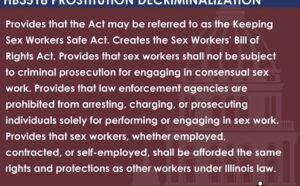WHEN GOVERNMENT OFFICIALS want to minimize media coverage, they often save their information dumps for a Friday. And if they want to seriously curtail public awareness, they do this before a long weekend.
This reduces discussion in the media because by the following week, it’s old news.
So what are we to make of the Supreme Court of Canada’s decision to release one of its most-anticipated rulings on a Friday (December 20) before Christmas and Boxing Day?
At the end of this week, Canada’s highest court will render its verdict in the federal government’s appeal of Canada (Attorney General) v. Bedford, Lebovitch and Scott.
Terri-Jean Bedford, a dominatrix, operated the “Bondage Bungalow”. Amy Lebovitch and Valerie Scott work for Sex Professionals of Canada, which advocates for legalization of the sex trade.
The three Ontario women won a landmark ruling in 2010 in the Ontario Superior Court advancing the rights of sex workers.
At the time, Justice Susan Himel’s decision stated that Criminal Code prohibitions on keeping a common bawdy house, living off the avails of prostitution, and soliciting in public for the purpose of prostitution were unconstitutional. Himel concluded that these laws violated sex workers’ legal rights to freedom of expression and security of the person.
In 2012, the Ontario Court of Appeal upheld Himel’s ruling concerning laws about keeping a common bawdy house and living off the avails.
However, three of the five judges on the Ontario appellate court panel upheld the ban on communicating in public for the purpose of solicitation, which overturned this aspect of Himel’s decision. The Ontario high court stated in its ruling that street soliciting “poses real and grave dangers” to sex workers.







So of course the best way of protecting sex workers from “real and grave dangers” of their occupation is to arrest them. Riiiight.